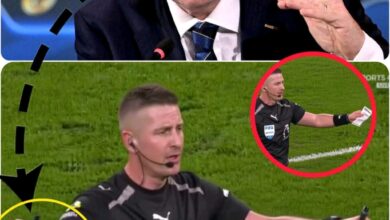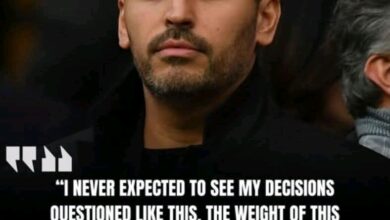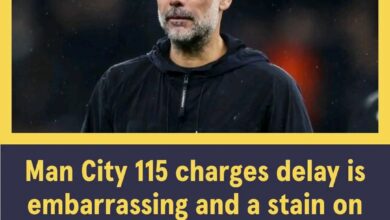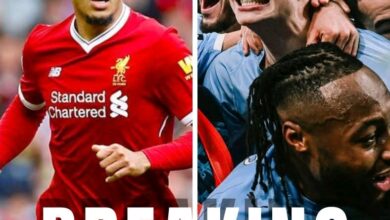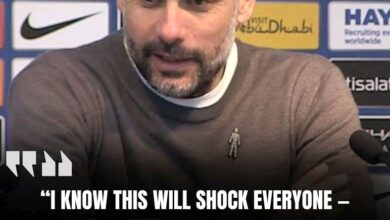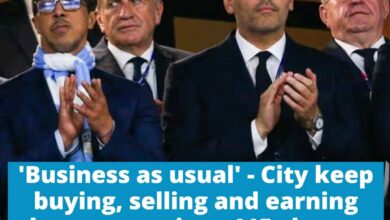The Two Clubs Michael Oliver is Banned From Refereeing
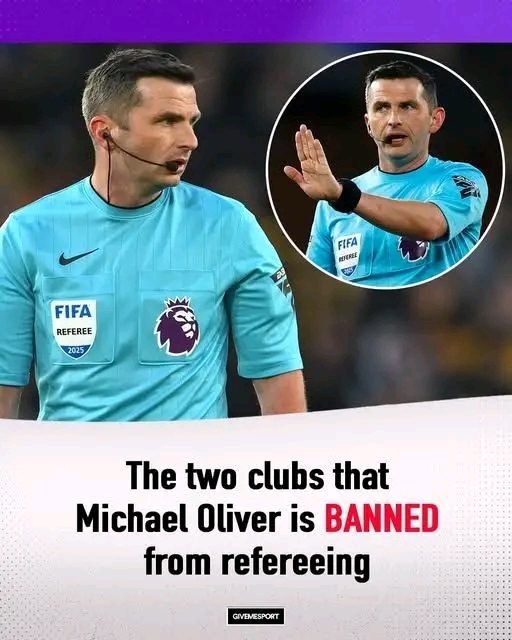
Few figures in modern English football divide opinion quite like Michael Oliver. Over the past decade and a half, the Northumberland-born referee has become one of the most recognizable faces in world football, officiating at the highest levels of the Premier League, UEFA competitions, and even the FIFA World Cup. Yet, alongside his reputation for professionalism and composure under pressure, Oliver has also been at the heart of several heated debates, most recently during Liverpool’s clash with Manchester City — a match that reignited the discussion about his impartiality and his unique restrictions when it comes to two particular English clubs.
This is the story of how Michael Oliver rose from a teenage referee in the North East to the most prominent official in English football, how his background shaped his career, and why he is forbidden from refereeing matches involving both Newcastle United and Sunderland. It’s also a look at how one controversial decision in a high-profile fixture has once again placed him under the microscope
Michael Oliver was born on February 20, 1985, in Ashington, a town in Northumberland best known for producing football legends like Jack and Bobby Charlton. Growing up in the heart of England’s football-obsessed North East, Oliver’s connection to the game was almost inevitable. What set him apart, however, was not a career with the ball at his feet, but rather one with a whistle in his hand.
Oliver began refereeing at just 14 years old**, encouraged by his father, Clive Oliver, who was also an official. The younger Oliver quickly demonstrated an exceptional understanding of the game, a calm authority beyond his years, and a drive to excel in a profession that often brings as much criticism as respect.
By his early twenties, Oliver was already refereeing at the highest levels of non-league football. His ascent continued rapidly, and in 2007, he joined the **National List of Referees**, officiating in the Football League. It was clear that English football had found a rising star in the officiating ranks
It was a remarkable achievements, not only for Oliver but also for English refereeing as a whole. The Premier League, often criticized for the average age of its officials, was finally seeing a generational shift. Oliver represented a new wave: fitter, younger, and better prepared to handle the intensity of the modern game.
His performances in those early years earned praise from both players and pundits. Former referee and PGMOL (Professional Game Match Officials Limited) chief Keith Hackett once described Oliver as “the best young referee this country has produced in a generation.
Oliver’s reputation only gre. Within a few years, he was officiating some of the biggest domestic matches — from Manchester derbies to title deciders. His calm demeanor, fitness, and clear communication style earned him respect on the international stage as well.
Despite this success, Oliver has never been far from controversy — a fact that comes with the territory of refereeing in the Premier League. His decisions have often made headlines, with supporters from rival clubs equally convinced of his bias against their side. But few episodes have generated as much debate as his recent involvement in the Liverpool–Manchester City match at the Etihad Stadium.
In what was billed as one of the season’s most anticipated fixtures, Manchester City hosted Liverpool in a clash that carried massive implications for the Premier League title race. But it wasn’t Erling Haaland’s goals or Pep Guardiola’s tactics that dominated the post-match discussion — it was Michael Oliver’s refereeing.
During the match, Liverpool thought they had found a way back into the game when Virgil van Dijk appeared to score, only for the goal to be ruled out for offside. The assistant referee’s flag went up, and after consultation, Oliver upheld the decision. The reason? Andy Robertson was judged to have interfered with play by obstructing City goalkeeper Gianluigi Donnarumma.
The Premier League’s official explanation stated that Robertson had made “an obvious action directly in front of the goalkeeper,” thereby affecting his ability to see the ball. However, television replays appeared to show that Robertson had merely ducked under the ball’s flight path without making contact or clearly blocking Donnarumma’s view.
The reaction was immediate and fierce. Liverpool supporters flooded social media with criticism, accusing Oliver of once again favoring Manchester City. Many pointed out that the defender’s movement was minimal and that Donnarumma’s line of sight was largely unobstructed.
The decision was especially galling for Liverpool fans because of Oliver’s history in this fixtur
In the previous season’s encounter between the two clubs, Oliver had faced similar scrutiny. During that match, City winger Jeremy Doku appeared to catch Liverpool midfielder Alexis Mac Allister with a high boot inside the penalty area. Despite appeals for a spot-kick, Oliver waved play on — and VAR did not intervene.
To many fans, the incident symbolized an ongoing pattern. Social media was flooded with accusations that Oliver was “protecting” Manchester City, while others suggested that Liverpool had become the unlucky victims of his strict interpretation of the rules.
Adding further fuel to the debate, statistics revealed that Michael Oliver has never sent off a Manchester City player in his Premier League career, despite officiating numerous matches involving the reigning champions.
In the wake of the latest controversy, Liverpool reportedly expressed their “serious concerns” to the PGMOL regarding Oliver’s handling of the game, joining a growing number of clubs that have questioned the standard of officiating in the league this seaso
While much of the criticism directed at Oliver comes from perceived bias, there are, in fact, two clubs that he legally cannot officiate — and for good reason. Those teams are Newcastle United and Sunderland, the two biggest clubs in the North East of England.
Oliver’s roots in Ashington, a town less than 20 miles from Newcastle, make him a proud Geordie. Given that regional loyalty, the Football Association and PGMOL maintain a strict policy to avoid any appearance of bias or conflict of interest. Referees are required to declare any club allegiance or family connection before each season’s appointments are finalized. Oliver himself has been candid about the rule. In an interview cited by the Express he explained:
> “We have to declare if we have an allegiance to any club or if a family member works at a club. You can’t do any match involving that team, and I can’t do Sunderland, either, for obvious reasons.”
His exclusion from Newcastle games is entirely understandable given his background. But Sunderland’s inclusion might surprise some fans. The reasoning is simple: the two clubs are bitter rivals. Appointing a referee from Newcastle to officiate Sunderland would be just as controversial as assigning a Merseyside native to a Manchester derby.
Former PGMOL chief Keith Hackett has elaborated on how these restrictions work
> “At the beginning of every season, the referees’ background information is audited. They complete a form that includes who they support, their playing history, and their current address. That information helps when making appointments. For example, you wouldn’t appoint a Sheffield-based ref for a Sheffield team.”
It’s a system designed to maintain transparency and protect referees from accusations of bias. But in Oliver’s case, his success and visibility mean that even without those regional ties, scrutiny remains relentless
Refereeing in the Premier League is a notoriously difficult job. Every decision is broadcast to millions, dissected by pundits, and replayed from multiple angles. Referees are expected to interpret rules consistently while managing the emotions and pace of some of the fastest football in the world
Michael Oliver has long been regarded as one of the best in the business. His colleagues frequently cite his fitness, confidence, and clarity of communication as exemplary. Yet, even for the best referees, one controversial moment can overshadow an entire season of solid performances.
Social media has only intensified the pressure. In the past, a referee’s decisions would be debated in newspapers or pubs; now, they are analyzed and criticized in real time by millions of fans online. Referees like Oliver find themselves trending on Twitter within minutes of a contentious call.
The PGMOL has recently introduced new initiatives to support referees’ mental health, recognizing the unique psychological toll of the job. Oliver himself has spoken about the human side of refereeing, admitting that mistakes are inevitable but emphasizing the importance of learning from them
The latest Liverpool–Manchester City controversy highlights a deeper issue: in football, perception often carries as much weight as reality. Even when a referee follows the laws of the game to the letter, if fans perceive unfairness, the damage to their reputation can be lasting.
Oliver’s impartiality has been questioned by various fanbases at different times. Arsenal supporters, for instance, have pointed to his record of disciplinary decisions against them, while Manchester United fans have criticized his strictness in high-stakes matches.
However, statistical analysis across multiple seasons shows that Oliver’s decisions are broadly consistent with those of his peers. Data compiled by football analysts suggests that his rate of issuing cards and awarding penalties is almost exactly in line with the Premier League average.
Still, numbers rarely ease the emotional reactions of fans whose teams feel wronged. In a sport where passion runs deep, referees are often the easiest scapegoats.
The Professional Game Match Officials Limited (PGMOL), which oversees referees in English football, has faced increasing pressure to improve transparency. After several high-profile errors this season, including missed VAR interventions and inconsistent interpretations of handball laws, clubs have begun demanding greater accountability.
Liverpool’s formal expression of concern following the City match was not an isolated incident. Arsenal, Tottenham, and Nottingham Forest have all voiced frustrations over refereeing standards in recent months.
In response, the PGMOL has increased post-match communication, publishing “VAR audio” from selected incidents to explain the decision-making process. While this is a step toward openness, critics argue it’s not enough.
Referees like Michael Oliver find themselves at the center of this debate, tasked with upholding integrity while navigating unprecedented scrutiny.
Despite the criticism, Oliver’s accomplishments remain remarkable. He has officiated FA Cup Finals, Champions League knockout matches, and **major international fixtures — milestones that few referees achieve.
His composure under pressure was particularly evident during the **2018 Champions League quarter-final** between Real Madrid and Juventus. In the dying minutes, Oliver awarded Madrid a penalty after Medhi Benatia’s foul on Lucas Vázquez — a decision that sent Juventus goalkeeper Gianluigi Buffon into a furious protest that earned him a red card.
The incident made global headlines, and Oliver faced days of intense media coverage and even death threats. Yet, his calm and confident handling of that moment reinforced his reputation as one of the top referees in world football.
Even Oliver’s harshest critics often concede that his professionalism is beyond question. Players frequently mention his ability to communicate clearly during games, defusing tension with authority rather than aggression.
Former players turned pundits, such as Gary Neville and Jamie Carragher, have described him as “the Premier League’s best referee,” citing his fitness and consistency. Neville once said: “If every referee was like Michael Oliver, the game would be in a better place.”
That praise underscores the complexity of refereeing: a single decision can turn public opinion overnight. For Oliver, every match brings the same challenge — to make the right calls in real time, within the laws of the game, knowing that millions will second-guess him afterward
The rule preventing Oliver from officiating Newcastle and Sunderland matches is not a punishment, but a safeguard. The FA’s system ensures that no referee is placed in a position where their impartiality could reasonably be questioned due to geography or family ties.
It’s the same principle applied elsewhere: referees from Manchester don’t oversee Manchester clubs; those from Merseyside avoid Liverpool and Everton fixtures. The goal is not to accuse officials of bias but to preserve public trust in the fairness of officiating. Oliver himself has said he appreciates the rule, as it removes any potential for misunderstanding or conflict of interest.
As technology continues to evolve, so too does the role of the referee. The introduction of VAR (Video Assistant Referee) has changed the landscape, adding layers of complexity to decision-making. While designed to eliminate “clear and obvious errors,” it has also introduced new controversies — particularly around subjective calls like handballs and offsides.
Michael Oliver, like most top officials, has had to adapt. He has often defended the use of VAR as a tool to support referees rather than replace them. Still, the system’s implementation has been inconsistent, leading to frustration from managers and players alike.
In the long term, figures like Oliver may play a key role in shaping how officiating evolves — not only through their performances but also through mentoring the next generation of referees
Michael Oliver’s story is one of dedication, controversy, and professionalism. From a teenage referee in Ashington to one of FIFA’s elite officials, his journey reflects both the rewards and challenges of life at football’s highest level.
He has been praised as a model referee and criticized as a symbol of inconsistency — sometimes within the same week. He cannot referee matches involving Newcastle or Sunderland, not because of wrongdoing, but because of where he comes from. And while fans may debate his decisions for years to come, few can question his commitment to the game.
In a footballing world where every decision is recorded, replayed, and dissected, Michael Oliver remains a reminder of the human element at the heart of sport. His job is thankless, his margin for error razor-thin, and yet, week after week, he steps onto the pitch, whistle in hand, knowing that perfection is impossible but fairness must always be the goal.
Love him or loathe him, Michael Oliver has become one of the defining referees of his era — a man whose decisions have shaped some of the most dramatic moments in modern football and whose integrity continues to guide him through the noise that surrounds every call he makes.










